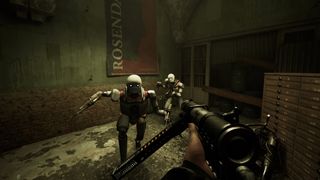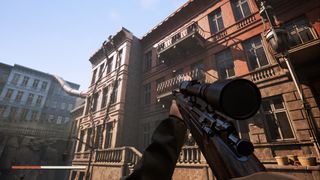Industria dev wants you to know 'we can't deliver [triple-A] and we don't want to'
The team behind the Half-Life inspired FPS says "we are not here to change the whole system, but we are here to be an alternative."
Industria has everything it needs to land a spot in an E3 sizzle reel. It's an FPS with an eerie, abandoned city to explore, lots of Cold War era guns to shoot at homicidal robots, and the graphical polish to stand up to plenty of today's big budget games.
But developer Bleakmill wants you to know that Industria is nowhere near the scale or length of those big budget games, and it's also the team's first project together. Industria started when the core members were just 19 years old.
"I often get messages about pre-ordering, 12 hour campaigns, multiplayer and comparisons to AAA games. We can't deliver that," co-founder David Jungnickel tweeted. Industria is only about four hours long, will cost $20, is entirely singleplayer, and was made by two to six people at various times throughout development.
That blunt, upfront expectation-setting is rare even in indie game development, but it pushes back against the unrealistic expectations facing small games that break out big, like Valheim. These caveats are in contrast to not only the approach of many triple-A studios, but independent ones like Splitgate's developer, which after finding success and raising $100 million has said that it wants to become "the next Riot Games."

Industria is a first-person shooter with a bigger focus on storytelling than is usual for the genre. As a young woman named Nora, you receive a message from a friend who has decided to investigate a secret research facility in Berlin. Nora pursues him into what appears to be an alternate reality, a European city lined with strange cables and machinery (ala Half-Life 2's City 17) watched over by a giant creature.
On paper, Industria is exactly the kind of game you might expect a major publisher to put out with lofty goals of releasing DLC, frequent updates, or a grand story arc meant to last 20-plus hours. Think of how BioShock Infinite changed its franchise's DNA from immersive sim-style worldbuilding to a more straightforward, considerably grander action-adventure, for better or worse.
"After a few years we reached a point where Industria often looked like a more high quality 3D production than it was at its core," Jungnickel told PC Gamer. "Not in the consistency and polish of triple-A productions, but more and more people started to compare Industria with Battlefield, Atomic Heart, BioShock or Call of Duty. While humbling to hear every time we heard that, we knew this honor and actually positive thing could quickly become a problem, as we were never and will never be able to deliver the same quality throughout and size of these productions we were getting compared to."
The biggest gaming news, reviews and hardware deals
Keep up to date with the most important stories and the best deals, as picked by the PC Gamer team.

Some of those early comparisons genuinely did push Bleakmill to expand the scope of its game beyond what might have been reasonable for their small team. A 2020 devlog shows the team discussing how Industria's opening featured a car driving sequence, with intermittent breaks where player control would be taken away. That was later scrapped to make Nora's journey from her apartment to the research facility one shorter, more seamless stretch of playtime, both reducing the amount of work the team would need to do and making the game a tighter experience.
"[Being compared to triple-A games] was a sign, we thought, that we made something right," Jungnickel said. "Growing up with the project (quite literally as I was 19 when I started and I am now 25) we understood where our place in this industry really is more and more, and that triple-A doesn't always just mean good."
Jungnickel adds that, regardless of how Bleakmill wants to make games, the team still respects what blockbuster, big-budget games do for the medium. The team is upfront about its influences ranging from Half-Life, BioShock, Portal, and the immersive sim genre.
"I'm sure that all these wonderful people have visions, ideas, and inspirations that go beyond your cliche settings or sexualized characters," Jungnickel said. "However, the framework of gigantic productions that [base decisions] off of the stock market often can't take risks (even creative ones). We are not here to change the whole system, but we are here to be an alternative."
Jungnickel is careful to balance his loftier statements with a dose of reality. The studio's game isn't out yet, of course, and the team doesn't have the experience many more senior developers do, so it's less about critiquing what doesn't work in big budget games and more about finding what's best for a team like theirs.
"We really don't want to come off as the guys that understood everything," Jungnickel said.
Jungnickel's tweets seem to have struck a positive chord with some in the game development community, including developers from the likes of Insomniac, Niantic, and Blizzard.
An often overlooked thing in this industry is the communication that goes from Devs to Fans. When you can be open, honest, and upfront about certain details it helps set everyone's expectations. 👌🏼 https://t.co/6GF301jA62September 19, 2021
I’ve been seeing more indies putting their feet down about this. Creators in general gotta stop the race to the bottom on charging for our work in general. Charge more for your commissions, freelance rates, talk to coworkers about wages, etc. folks! https://t.co/VwSxICDZP4September 19, 2021
4 hours is quickly becoming the ideal game length for me, no lie. shorter dev cycles, hopefully little-to-no crunch, and (where applicable) a satisfying narrative with no filler. https://t.co/yBwG8ryb3lSeptember 19, 2021
Industria isn't alone in its efforts to keep things looking pretty but restrained, though. Ninja Theory's Hellblade: Senua's Sacrifice received critical acclaim in 2017 for its gorgeously rendered world and characters, and stuck to a very linear adventure format that eschewed a huge open map and wrapped up in about seven hours. Or take Plague Tale: Innocence, which graphically impresses with its writhing hordes of rats, but clocks in at a relatively modest 10 hours.
While monoliths like Fortnite and Assassin's Creed continue to balloon, the past several years have occasionally shown us that games can still look like they cost a million dollars while not quite fitting into the expectations we've come to take for granted.
We'll see if Industria has what it takes to set itself apart when it releases on September 30 on Steam, GOG, and the Epic Games Store.
Joseph Knoop is a freelance writer specializing in all things Fortnite at PC Gamer. Master of Creative Codes and Fortnite's weekly missions, Joe's always ready with a scoop on Boba Fett or John Wick or whoever the hell is coming to Fortnite this week. It's with a mix of relief and disappointment that he hasn't yet become a Fortnite skin himself. There's always next season...
Most Popular








